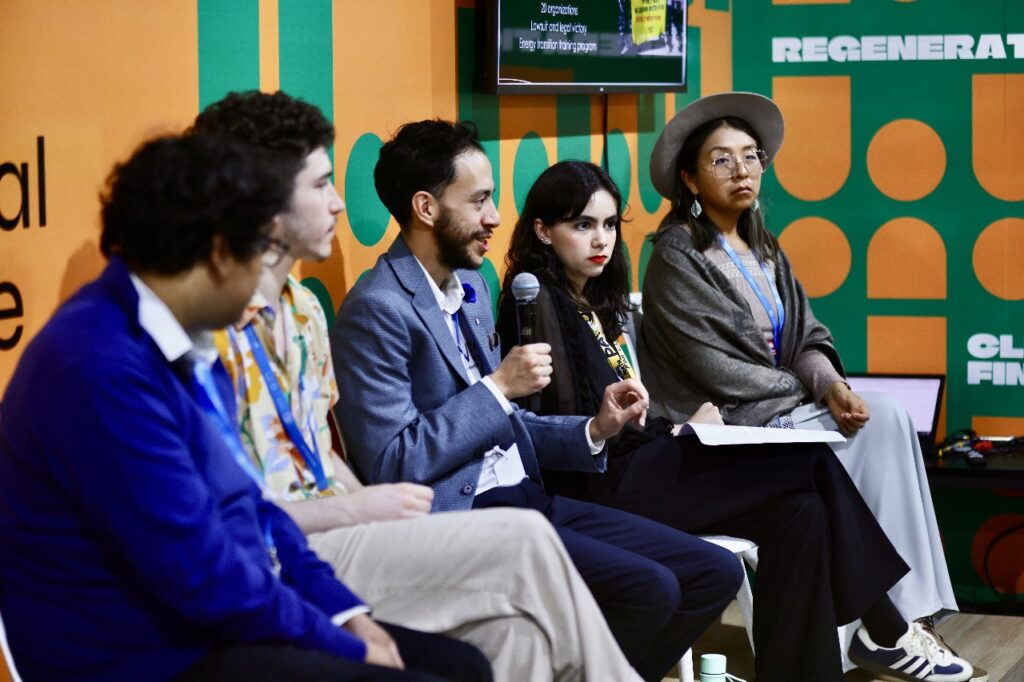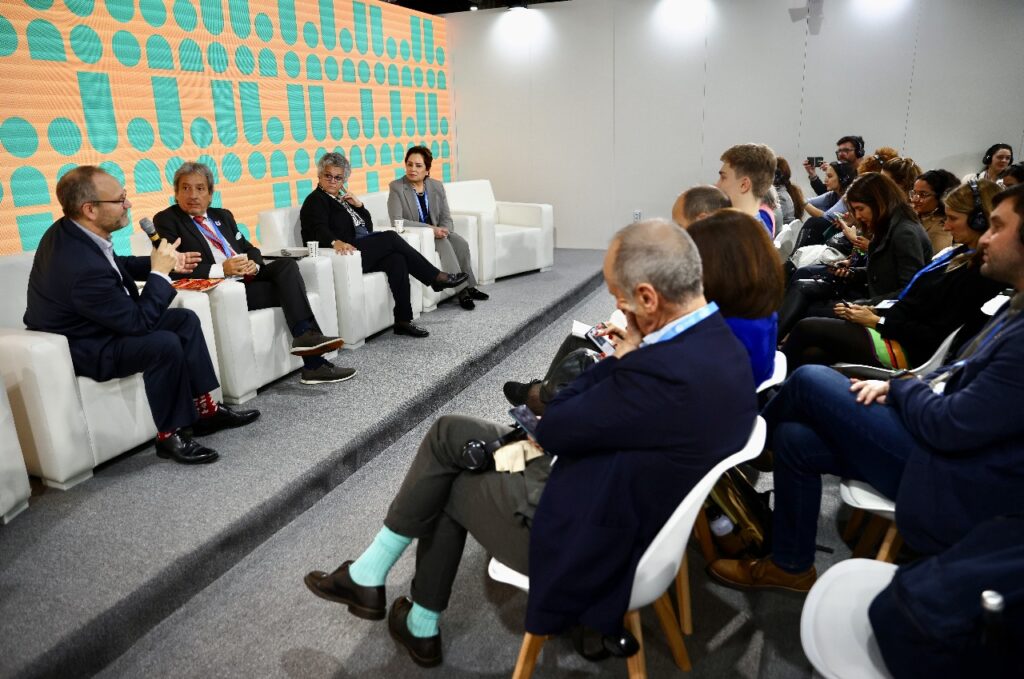The young people, who will “suffer the consequences of climate change for most time than other generation”. The women that “carry the world burden” to educate children and to protect their communities. The humblest workers from whom the transition not necessarily will mean better and green jobs, as they are not being trained. The poor countries that contribute with the lowest emissions rates, but are being pushed to join the decarbonization of the economy with poor alternatives for their most vulnerable population.
All of them met into the Regional Climate Foundations Pavilion last Saturday (16) in different events that approached their vulnerabilities in the face of climate change — but also their strengths. “The lack of resources affects us equally, but there are opportunities for capacity building. If we organise ourselves, it will be much more easily to deal with climate change than if we do it individually”, said Bruno Sirote, from the youth organisation Jóvenes por el Clima Argentina, one of the speackers in the panel ‘Weaving networks of cooperation: the youth climate movement’.
“A just transition it is not an automated, computerised process. It supposes a fair and equitable mechanism, which means that every community or population will be treated according to their condition, with different measures for different people”, observed Ruchi Chaudary, a leader at Climate Action Network South Asia, who participated in the debate ‘Just Energy Transition: Securing the Rights of Marginalized Communities through an Inclusive Mitigation Pathway, Addressing Gender, and Intersectionality’.
In the first panel, the young leaders of their generation remembered the unprecedented growth of the youth climate activism — including some considerable impacts. One of them was the judicial victory in Mexico that guaranteed homes for the families of the first recognized community displaced by climate change: the El Bosque village, that is being uninhabitable due to rising ocean levels.
“Climate change is the background music of our generation, we are its most affected victims because we will be under its effects longer than any other generation”, said Camila Campillo Sangines, from Nuestro Futuro, an organisation os young lawyers in Mexico. “We have a distinct and legitimate interest in demanding adaptation and compensation. But it is very difficult to get the courts to recognize that our voices must hear”, completed.

The movement, however, faces significant challenges that limit its medium and long-term development, such as a lack of international visibility and sustained financial support. To overcome this condition, they are making alliances. Sirote, for example, is involved in creating a coalition of youth in Latin America to prepare young people to the COP30: “It will be held in our territory, and we want the youth movement shine in Brazil”.
“We have a lot of energy for activism. We will arrive at the next COP articulated and with a clear position”, said Wara iris Ruiz Condori, an indigenous woman from Bolivia that works with UNICEF.
South Asia united for just climate transition
As the Latin American youth movement, researchers from the South Asia asked for more visibility to the vulnerable people from this region. Mohammad Emran Hasan, the head of Climate Justice & Natural Resources Rights at Oxfam Bangladesh remembered that even though his country contributes with a very little percentage of the greenhouse gas emissions, its population is in risk. World Bank research from 2021 claims that since 2000, the GDP of some of the most vulnerable nations in the world has decreased by more than 20% due to climate change. By 2030, climate change might force an extra 132 million people into poverty, primarily in South Asia and Sub-Saharan Africa.
“Many people needed to migrate to urban areas to avoid the worst effects of climate change. Now they are engaged in a system of informal jobs, facing extreme heat in poor conditions”, explained.
These people should be included in the loss and damage program, but there is no money, the experts of this panel said. And now, they are being victims for the second time, as the local economy is based on fossil fuels that need to be extinct to limit the Earth temperature — but people aren’t being trainned to get the jobs in this new economy. “The transition is needed, but people should be compensated”, completed.
The International Labor Organization estimates that by 2030, the shift to a green economy might generate up to 24 million new jobs worldwide. “We need to reflect on whether we are really offering equal and fair opportunities to everyone. Only by changing the entire system will we guarantee a truly just transition”, said Ruchi Chaudary, a leader at Climate Action Network South Asia.
The panellists highlight specially the conditions of women in that society that is mostly headed by men. According to a UN Women report from 2022, women are disproportionately impacted by climate change, particularly in rural and low-income areas, and are 14 times more likely than males to die in disasters due to climate change. Women who have disabilities, who are indigenous or social excluded, and live in remote geographical are the most vulnerable. “This aspects also need to be considered”, completed Banasree Mitra Neogi, Program Director, Manusher Jonno Foundation.
“No one life can stay behind”, the experts claimed.
Lima+10
Also on Saturday, the Lima+10 meeting took place, celebrating the first decade since COP20, held in Lima in 2014. This was the climate conference that laid the foundations for the Paris Agreement, which was signed the following year in the French capital.

The meeting brought together the president of COP20, then Peruvian environment minister Manuel Pulgar-Vidal, the former environment ministers of Brazil, Isabella Teixeira, and Mexico’s international relations minister, Patricia Espinosa, as well as Gonzalo Muñoz, ex Climate champion under the chilean presidency in 2019.
The speeches echoed the progress made in this decade, stressed the importance of multilateralism for the agreements to be implemented and recognised the importance of civil society participation in the COPs.

